
Asta Sofie Amalie Nielsen was a Danish silent film actress who was one of the most popular leading ladies of the 1910s and one of the first international movie stars. Seventy of Nielsen's 74 films were made in Germany where she was known simply as Die Asta.
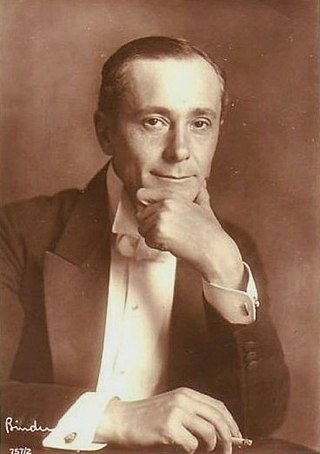
Alfred Peter Abel was a German film actor, director, and producer. He appeared in more than 140 silent and sound films between 1913 and 1938. His best-known performance was as Joh Fredersen in Fritz Lang's 1927 film Metropolis.

Joyless Street, also titled The Street of Sorrow or The Joyless Street, is a 1925 German silent film directed by Georg Wilhelm Pabst starring Greta Garbo, Asta Nielsen and Werner Krauss. It is based on a novel by Hugo Bettauer and widely considered an expression of New Objectivity in film.

The Vice of Humanity is a 1927 German silent drama film directed by Rudolf Meinert and starring Asta Nielsen, Werner Krauss and Alfred Abel. It premiered at the Marmorhaus in Berlin.
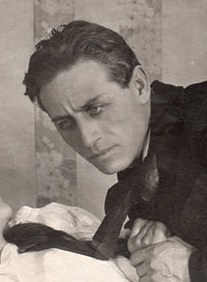
Gregori Mikhailovich Chmara was a Ukrainian-born stage and film actor whose career spanned six decades.
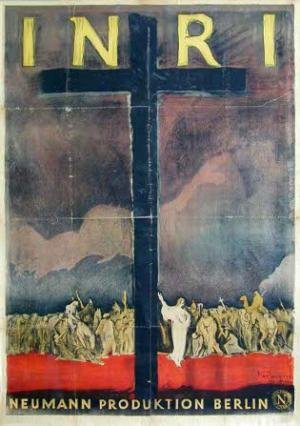
I.N.R.I. is a 1923 German silent religious epic film directed by Robert Wiene and starring Gregori Chmara, Henny Porten, and Asta Nielsen. The film is a retelling of the events leading up to the crucifixion of Jesus Christ. It was based on a 1905 novel by Peter Rosegger. It was reissued in 1933 in the United States with an added music track and narration as Crown of Thorns.

Intoxication is a 1919 German silent drama film directed by Ernst Lubitsch and starring Asta Nielsen, Alfred Abel and Karl Meinhardt. It was based on the play Brott och brott by August Strindberg, which was later remade as the 1928 film Sin. Lubitsch was loaned out by UFA to the smaller Argus-Film for the production.

The Flame is a 1923 German silent drama film directed by Ernst Lubitsch and starring Pola Negri, Hermann Thimig, and Alfred Abel. The film is based on a play by Hans Müller. In the United States it was released under the alternative title Montmartre. It was the last film Lubitsch made in Germany before emigrating to Hollywood where he directed his first American film Rosita for United Artists the same year.

Man Without a Name is a 1932 German drama film directed by Gustav Ucicky and starring Werner Krauss, Helene Thimig and Mathias Wieman. It was shot at the Babelsberg Studios in Berlin. The film's sets were designed by the art directors Robert Herlth and Walter Röhrig. It was produced and distributed by UFA and premiered on 1 July 1932. It is inspired by the 1832 novel Colonel Chabert by Honoré de Balzac, updated to the modern era with the setting shifted from Restoration France to Weimar Germany. A separate French-language version Un homme sans nom was also produced.
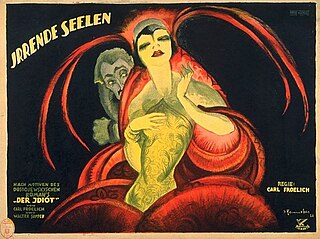
Wandering Souls is a 1921 German silent drama film directed by Carl Froelich and starring Asta Nielsen, Alfred Abel, and Walter Janssen. It was based on Fyodor Dostoyevsky's 1869 novel The Idiot. The film was the first of three to be made by Russo Film, a small production company set up by Decla-Bioscop to make literary adaptations. The 123-minute film was shot at the Johannisthal Studios in Berlin. It premiered on 3 March 1921 at the Marmorhaus in Berlin.
Athletes is a 1925 German silent film directed by Frederic Zelnik and starring Asta Nielsen, Gregori Chmara and Arnold Korff.

Hedda Gabler is a 1925 German silent drama film directed by Franz Eckstein and starring Asta Nielsen, Paul Morgan and Frida Richard. It is based on Henrik Ibsen's 1891 play Hedda Gabler. The film was released on 30 March 1925.
Living Buddhas is a 1925 German silent film in five chapters, directed by Paul Wegener and starring Wegener, Asta Nielsen and Käthe Haack. It was co-written by Wegener and Hans Stürm. Wegener cast himself as the evil High Llama of a devil cult. Danish actress Nielsen's film career went downhill quickly with the advent of sound films. It was made at the Staaken Studios in Berlin. Only five minutes of footage survive of the original 139-minute running time.
The White Roses is a 1916 German silent film directed by Urban Gad and starring Asta Nielsen, Ernst Hofmann, Max Landa and Fred Immler.
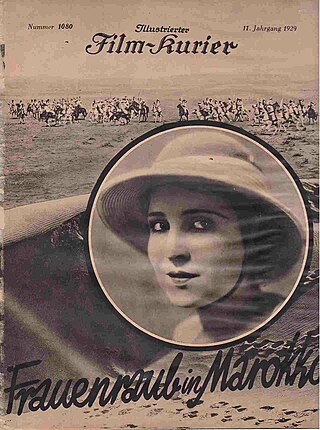
Orient is a 1928 German silent adventure film directed by Gennaro Righelli and starring Dolly Davis, Vladimir Gajdarov and Claire Rommer. It was shot at the Halensee Studios in Berlin. The film's art direction was by Otto Erdmann and Hans Sohnle. It premiered at the Ufa-Pavillon am Nollendorfplatz.

Downfall is a 1923 German silent film directed by Ludwig Wolff and starring Asta Nielsen, Gregori Chmara and Charlotte Schultz. The film was produced by Nielsen's own production company. The sets were designed by the art director Heinrich Beisenherz. It premiered in Düsseldorf and had its Berlin premiere at the Marmorhaus. The film survives but is missing its first reel.
The Merry-Go-Round is a 1920 German silent film directed by Richard Oswald and starring Asta Nielsen, Conrad Veidt and Eduard von Winterstein. It was adapted from the 1897 play, La Ronde by Arthur Schnitzler.

Battle of the Butterflies is a 1924 German silent drama film directed by Franz Eckstein and starring Asta Nielsen, Reinhold Schünzel and Hans Brausewetter. It is based on a play by Hermann Sudermann. It was shot at the National Studios in Berlin.
The House by the Sea is a 1924 German silent film directed by Fritz Kaufmann and starring Asta Nielsen, Gregori Chmara and Albert Steinrück. The film is adapted from the play by Stefan Zweig.

The Case of Prosecutor M is a 1928 German silent mystery film directed by Rudolf Meinert and Giulio Antamoro and starring Maria Jacobini, Jean Angelo and Gregori Chmara. It was released in the United States in 1930 by Unusual Photoplays Inc. as The Strange Case of the District Attorney with English intertitles by Don Bartlett and an added sound effects track.














